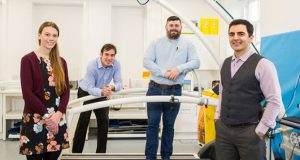Research Projects Seeking To Improve Health Prospects For Older Men And Women Need Participants
 Volunteers are sought for a major research programme undertaken at Leeds Beckett University, which will investigate factors that affect the health and quality of life of the UK’s ageing population.
Volunteers are sought for a major research programme undertaken at Leeds Beckett University, which will investigate factors that affect the health and quality of life of the UK’s ageing population.
The three-stranded programme, conducted by PhD students Mathew Butterworth, Matthew Lees and Emily Gregg of the University’s School of Sport, seeks to look at dietary intake and physical activity levels of men and women aged up to 75, as well as gaining a better understanding of the age-associated loss of muscle mass. The research will also explore the differences between older adults who have a history of falls and those who do not.
Dr Theocharis Ispoglou, who is overseeing two of the projects, said he expected that the findings would inform communities and policy makers about what needs to be done to best help the UK’s ageing population.
In the first stage of his research, PhD student Mathew Butterworth investigated interplay between dietary intake, physical activity levels, and physical performance of men and women during their early retirement years (65-75) when there is an acceleration of decline in muscle mass and strength.
“We are hoping to find out how diet and exercise can be used to improve functional status, muscle and bone health in this age group, and our preliminary findings suggest that dietary intakes are inadequate in this population which results in reduced muscle mass and strength” he said.
“Loss of muscle and strength is a natural part of ageing and has a number of health consequences. These include osteoporosis and a greater risk of falls. These risks increase greatly at age 80 years and over. Increasing the amount of protein in the diet would help, but high protein diets make people feel fuller, so they are less likely to be able to get enough of the other nutrients and energy that they need from food. Amino acids are important because they are the building blocks of proteins. Therefore, for stage two of the research we are looking for volunteers between the ages of 60-80 years of age to investigate how nutritional supplements containing amino acids affect the appetite of older people in comparison to protein supplements”.
PhD student Matthew Lees is looking for volunteers from two age groups: 18-45 years and 60 to 80 years, to gain a better understanding of the age-associated loss of muscle mass (sarcopenia).
“The loss of muscle mass and strength with age is a natural and inevitable process and can lead to a number of health consequences including osteoporosis, an increased risk of falls, and greater risk of mortality,” explained Matthew. “Such risks increase greatly in those aged 80 years plus. Given our ageing population, there is an urgent need to identify the causes of sarcopenia and to find ways in which dietary protein and exercise training may help people maintain muscle mass, functional capacity and quality of life. It is unclear if and how the ageing process affects the muscle’s response to essential amino acids or resistance exercise. Furthermore, it is not clear to what extent the adoption of a sedentary or active lifestyle affects these processes either.”
Researcher Emily Gregg is investigating the differences between older adults who have a history of falls and those who do not. Her study will explore the ability of those adults to perform a number of tasks such as standing and walking from a chair and balance tasks. Alongside this, muscle strength will be measured and scans of muscles and bones will be performed.
Emily, who is also looking for volunteers for the research, said: “It is hoped that the research findings can help identify and understand why some older adults are at a greater risk of falling over and in the long term help to prevent these falls, reducing the negative effects of falling amongst older adults.
“Falling in the elderly poses a substantial problem in the UK. There has been lots of previous research focussed around falls and a wide range of factors which increase the risk of falls have been identified. Generally, these factors are linked to balance and stability, strength and power, and movement ability. However, there has been a lack of agreement about which factors are most important. “
If you would like to volunteer to take part in the study or would like more information, email Mathew Butterworth at m.butterworth@leedsbeckett.ac.uk, Matthew Lees at m.lees@leedsbeckett.ac.uk or Emily Gregg at e.l.gregg@leedsbeckett.ac.uk.






